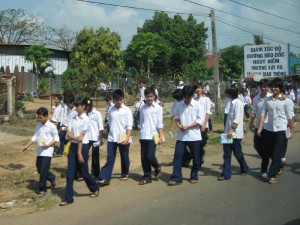A glimpse at Vietnamese education
02/08/2009
Children going home from school"
Molly asked some great questions about education in Vietnam, and while I'm no expert, I'll share the little I have learned so far. The Ministry of Education and Training (MOET) supervises all levels of education in Vietnam and its mission is to build the future of the nation, which as of July 2008 had a population of just over 86 million. There is a 2-child policy, and one of the slogans I've heard is "Stop at two to educate your children better."
From the MOET website (http://www.en.moet.gov.vn/), I see that the structure of Vietnamese education spans from the Creche (for children 3 months to 3 years, more prevalent in urban areas), to Primary (age 6-10, compulsory, which is why literacy is so high in this developing nation), to Lower Secondary Education (11-14, not compulsory). At that point, a child evidently tracks into either Upper Secondary (for 3 years) or Secondary Technical and Vocational (for 3 or 4 years). Upon graduation from Secondary School, the student takes a University Entrance Exam on a fixed group of subjects, and based on performance and moral character can then be admitted to one of the public universities or to the equivalent of junior college. I've been told that the system here is a "pipeline," and once you get out, it is difficult to get back in.
Securing a place in a public university is a key to success, especially for children from rural communities. Of the approximately one million high school graduates each year, only 20 percent have a seat in one of the nation's public universities, and approximately 20,000 students are studying abroad at any one time. Given the cost of studying abroad, iti would seem that access to higher education outside Vietnam is limited to economically privileged children. The nation is hungry for higher education, so there are a number of 2 + 2 programs with schools outside Vietnam, and there are students doing online graduate programs from European schools. For those of you who are education majors, as of a few years ago a school year consisted of 35 weeks of schooling per year with a total of approximately 660 hours of instruction/year. I am not sure if students pay tuition to attend primary and secondary school, but I have heard there are a number of fees (uniforms, books, fees related to subject matter). Teachers are not trained at the universities, but instead at several Teacher Training Schools (there are schools in Hanoi, Ho Chi Minh City, and Nha Trang, and I'll be speaking at the latter school in April).
Photocopied texts at the University level

Molly asked about educational reform, and if it is starting in the primary grades as well as at the university level. The answer is that they are trying to reform the entire educational structure, but there are many challenges. There are not enough teachers, let alone trained teachers. In many areas teachers and students lack adequate facilities, textbooks, and teaching aids. It is a very ambitious undertaking--attempting to reform structure, access, teaching methods, the ways students learn, and more, all within a relatively short amount of time (some goals are to be met by 2010). Many of the pedagogical techniques being introduced now--active learning, critical thinking, and assessment--are needed for citizens of a nation that wants to be an active player in the global economy. As an educator, though, I keep thinking about other, perhaps unintended, changes educational reforms will bring. I'll close with a small example that is not really related to education. In Vietnam it is the custom to remember the deathdate of a person, and to observe it with a meal in that person's honor. Deathdates have been more important than birthdays, but in recent years, with more exposure to the western world, that is changing. Now, at least in cities, children want birthday parties and cakes and presents. Perhaps this is a trivial example. Here's another. With the influx of western tourists, the city of Nha Trang is beautifying the city by planting shrubs and relocating the fishermen who live in the harbor and dump their refuse in the water. This is definitely a step forward in terms of sanitation and hygiene. When it comes to reform, whether it is educational or environmental, there are many challenges. Fortunately, the people I've met so far seem motivated and energetic. They need to be, given the tasks that lie ahead!
